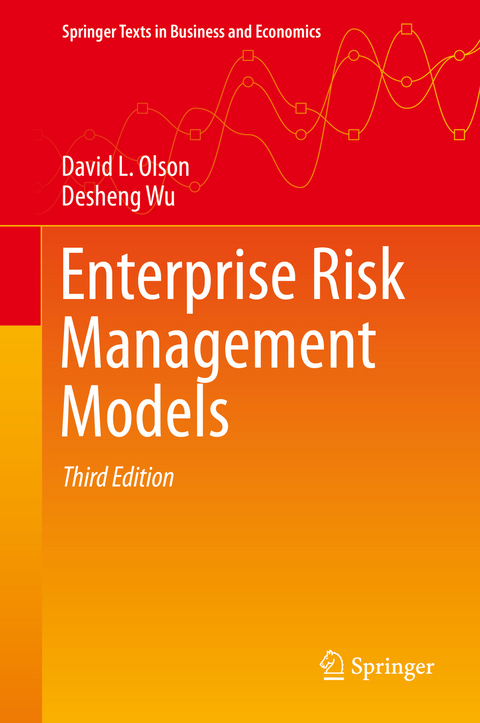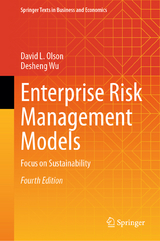
Enterprise Risk Management Models
Springer Berlin (Verlag)
978-3-662-60607-0 (ISBN)
- Titel erscheint in neuer Auflage
- Artikel merken
This book offers a comprehensive guide to several aspects of risk, including information systems, disaster management, supply chain and disaster management perspectives. A major portion of the book is devoted to presenting a number of operations research models that have been (or could be) applied to enterprise supply risk management, especially from the supply chain perspective. Each chapter of this book can be used as a stand-alone module on a respective topic, with dedicated examples, definitions and discussion notes.
This book comes at a time when the world is increasingly challenged by different forms of risk and how to manage them. Events of the 21st Century have made enterprise risk management even more critical. Risks such as suspicions surrounding top-management structures, financial and technology bubbles (especially since 2008), as well as the risk posed by terrorism, such as the 9/11 attacks in the U.S. as well as more recent events in France, Belgium, and other European countries, have a tremendous impact on many facets of business. Businesses, in fact, exist to cope with risk in their area of specialization.
David L. Olson is the James & H.K. Stuart Chancellor's Distinguished Chair and Full Professor at the University of Nebraska. He has published research in over 150 refereed journal articles, primarily on the topic of multiple-objective decision-making, information technology, supply chain risk management, and data mining. He teaches in the management information systems, management science, and operations management areas. He has authored over 20 books and is a member of the Decision Sciences Institute, the Institute for Operations Research and Management Sciences, and the Multiple Criteria Decision Making Society. He was a Lowry Mays endowed Professor at Texas A&M University from 1999 to 2001. He was named the Raymond E. Miles Distinguished Scholar for 2002, and was a James C. and Rhonda Seacrest Fellow from 2005 to 2006. He was named Best Enterprise Information Systems Educator by the IFIP in 2006 and is a Fellow of the Decision Sciences Institute. Desheng Dash Wu is a distinguished professor at the University of Chinese Academy of Sciences. His research interests include enterprise risk management, performance evaluation, and decision support systems. His has published more than 80 journal papers in such journals as Production and Operations Management, IEEE Transactions on Systems, Man, and Cybernetics: Systems, Risk Analysis, Decision Sciences, Decision Support Systems, European Journal of Operational Research, IEEE Transactions on Knowledge and Data Engineering, et al. He has coauthored 3 books with David L Olson, and has served as editor/guest editor for several journals such as IEEE Transactions on Systems, Man, and Cybernetics: Part B, Omega, Computers and OR, International Journal of Production Research.
Enterprise Risk Management in Supply Chains.- Risk Matrices.- Value-Focused Supply Chain Risk Analysis.- Examples of Supply Chain Decisions Trading Off Criteria.- Simulation of Supply Chain Risk.- Value at Risk Models.- Chance Constrained Models.- Data Envelopment Analysis in Enterprise Risk Management.- Data Mining Models and Enterprise Risk Management.- Balanced Scorecards to Measure Enterprise Risk Performance.- Information Systems Security Risk.- Enterprise Risk Management in Projects.- Natural Disaster Risk Management.- Sustainability and Enterprise Risk Management.- Environmental Damage and Risk Assessment.
| Erscheinungsdatum | 05.03.2022 |
|---|---|
| Reihe/Serie | Springer Texts in Business and Economics |
| Zusatzinfo | IX, 225 p. 51 illus. |
| Verlagsort | Berlin |
| Sprache | englisch |
| Maße | 155 x 235 mm |
| Gewicht | 524 g |
| Themenwelt | Mathematik / Informatik ► Informatik ► Theorie / Studium |
| Wirtschaft ► Betriebswirtschaft / Management ► Allgemeines / Lexika | |
| Wirtschaft ► Betriebswirtschaft / Management ► Unternehmensführung / Management | |
| Schlagworte | Data envelopment analysis • Disaster Risk Management • Enterprise Risk Management Process • financial risk management • Simulations • Supply Chain Risk • Supply Chain Risk Management |
| ISBN-10 | 3-662-60607-0 / 3662606070 |
| ISBN-13 | 978-3-662-60607-0 / 9783662606070 |
| Zustand | Neuware |
| Haben Sie eine Frage zum Produkt? |
aus dem Bereich



